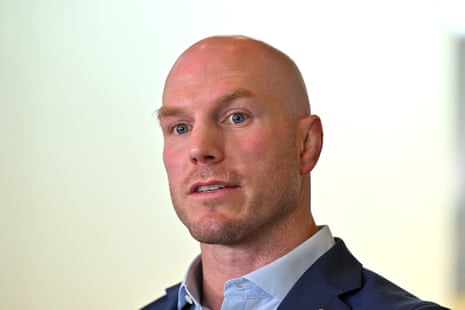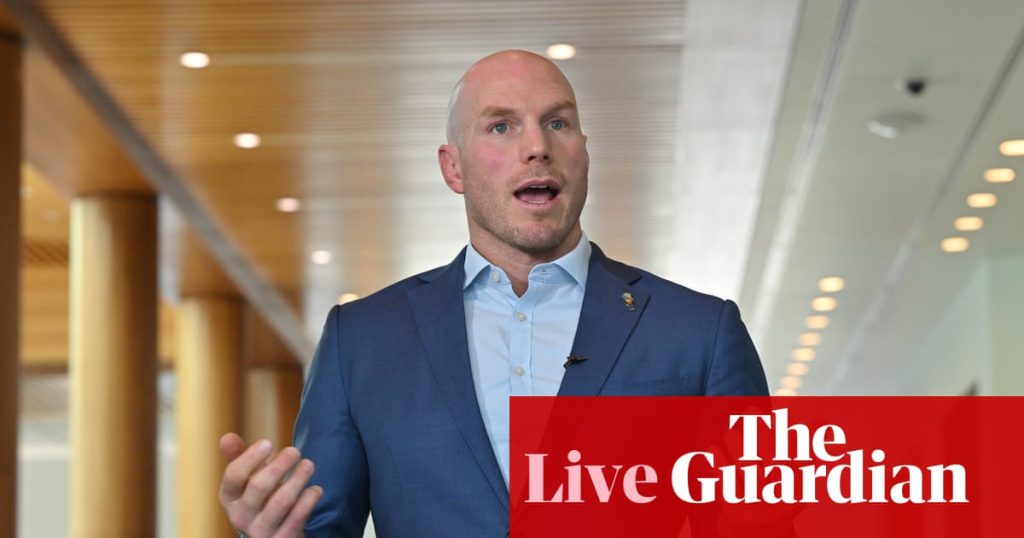David Pocock urges ANU council to ‘get on with it’ and change leadership
Caitlin Cassidy
The independent senator for the ACT, David Pocock, has urged the Australian National University’s council to “get on with it” and change its leadership as pressure mounts over the future of the vice-chancellor Prof Genevieve Bell’s position.
Speaking to ABC Radio Canberra on Tuesday, Pocock said he had spoken to staff, students, professors and deans about the situation, and there was a “huge amount of dissatisfaction” in the leadership.
I think we’re hopefully nearing the point where we do see some change in leadership at the top. I would urge the council to get on with it now. Based on what I hear, the current leadership simply doesn’t have the trust or any faith that they can be turned around.

Five of six deans at ANU expressed their lack of confidence in Bell to ANU’s chancellor, Julie Bishop, during meetings last Tuesday, sources have confirmed. It comes after backlash over the university’s ongoing restructure and related job cuts.
A spokesperson for ANU said they were not commenting on “speculation” in media reports that suggested Bell’s departure was imminent.
Key events
Liberal and Labor MPs agree Price’s comments were wrong
Two federal politicians from across the political divide have agreed Jacinta Nampijinpa Price’s comments about Indian immigration were wrong, though the Liberal representative for the seat of Casey declined to join calls for an apology.
Aaron Violi, the Liberal MP, declined to “provide commentary or offer public advice” to his party room colleague but said:
I agree they were wrong and a mistake and she should have walked them back as she did very quickly after they were made.
It’s a reminder to us all to be careful with our words and they can carry impact and have power and we always have to be aware of that.
Labor’s Sally Sitou, the MP for the Sydney seat of Reid, added to calls by Anthony Albanese and other Labor politicians for a public apology from Price:
I think an apology would say to the Indian Australian community that we respect their role in our society, that we understand that they are contributing so much to our community and that they should not be dismissed as being here only for the vote, which is totally incorrect.
Calls grow for Price to apologise for immigration comments
Labor’s education minister, Jason Clare, and a former Liberal MP have added to calls for Jacinta Nampijinpa Price to apologise for comments suggesting the Albanese government was supporting Indian immigration for political reasons.
Clare said it was “obvious” Price should apologise and cheered on the Coalition shadow minister, Julian Leeser, for offering his own apology on behalf of the party. Clare told the ABC:
Can I give a shout out to Julian Leeser, the senior member of the Coalition who I hold in high regard for the comments that he made … She should have apologised immediately and still should apologise now.
The former Liberal MP Jason Falinski also weighed in, telling the ABC:
Just because she should be allowed to say something does not mean you should say them.
This is away from what we stand for as a political movement. It is what Liberals throughout the ages have always stood against so I’m not entirely sure what Jacinta was trying to communicate when she said that. But I think how it has been interpreted by many people is actually diametrically opposed to the very reason our party was formed.
Falinksi said he saw parallels between Price’s comments and the former Liberal leader John Howard’s comments opposing Asian immigration in the 1980s, adding:
Smart people learn from their mistakes, really smart people learn from the mistakes of other people.
Education minister says super-commission can boost high school completions
Jason Clare has said his proposed merger of four education agencies into one new super-body could help more students finish high school by coordinating school policy decisions.
The federal education minister told the ABC he would coordinate with counterparts in the states and territories on the best way of bringing four national schools authorities together. Clare said:
What I am proposing here is that we bring them all under the one roof to improve coordination but something that is bigger potentially than the sum of its parts – an organisation that can support all states to make sure that we hit those targets and turn around that decline in the number of kids finishing high school.

Benita Kolovos
Victorian opposition leader hits back after suspension
The Victorian opposition leader, Brad Battin, has released a statement accusing the government of suspending him from parliament because he asked “repeated questions about the state’s crime crisis”.
It reads:
Jacinta Allan has no answers when it comes to the crime crisis, so she is shutting down the questions.
Labor is trying to deflect attention from their failures to protect Victorians, but people can see through the political spin. Victorians just want to feel safe in their homes and they just want a government that will act on crime.
In the chamber, the speaker made it clear she had suspended Battin for repeatedly disrespecting her authority. This included by making interjections when she was on her feet.
Penry Buckley
NSW government will respond to drug summit recommendations by end of this year
The NSW government says it will respond to the recommendations of last year’s drug summit, including a suggested legal defence for drivers who use medicinal cannabis, by the end of this year.
In parliament earlier, the Sydney independent MP, Alex Greenwich, asked if the government was planning to introduce a defence for prescribed medicinal cannabis users who return a positive roadside test for the cannabinoid THC while driving unimpaired.
Greenwich, who himself has a legal prescription, said it helped him manage anxiety and insomnia, but that THC could be detected “for days if not weeks after it no longer impacts driving”.
The NSW minister for roads, Jenny Aitchison, said the government would respond to the recommendation, and others made at the drug summit, later this year.
Look, we understand the difficulty that is faced by some people who can’t drive because they use medicinally prescribed cannabis.
It is important though that we balance support for people who are benefiting from this … and community road safety.
The drug summit held two days of forums in regional NSW in October and two days in Sydney in December last year.
Penry Buckley
Cautious welcome for DV rental reforms
The NSW government’s proposed improvements to the rental rights of survivors of domestic violence have been cautiously welcomed by the crossbench, who say they will watch legislation closely to see if changes are weakened like other recent reforms.
The NSW Greens housing spokesperson, Jenny Leong, says the reforms, which make it easier for survivors to leave rentals shared with alleged perpetrators, are “long overdue”, adding it is “crucial that we get them right” for the “many people trapped in unsafe households”:
Given the premier’s very recent history of undermining his own government’s landmark rental reforms to appease landlords, the Greens will be looking very closely at not only this legislation but also how the reforms are rolled out and applied.
Leong says the Minns government’s changes to legislation ending no-grounds evictions in NSW have created a “loophole” which means all renters continue to live under housing insecurity.
Changes to laws which prevent evictions without a valid reason in NSW came into effect in May. Renovations can be a valid reason for an eviction.
Under an amendment which came into effect in June, landlords now longer need to provide a quotation for renovations, only a written statement to tenants explaining why repairs are significant and why the property must be vacated for them to be carried out.

Graham Readfearn
Greens leader says renewables industry should be ‘angry’ at Business Council climate report
The Greens leader, Larissa Waters, has been in front of Queensland’s renewable energy industry this morning giving a speech to a Smart Energy Council summit in Brisbane.
The Albanese government is expected to set its 2035 climate target this month, with previous advice from the Climate Change Authority suggesting a range of between 65% and 75%.
The authority is yet to deliver its updated advice, which it must do before the cabinet discusses the target. Waters said:
Coal and gas exports are the ceiling on Australia’s climate ambition and they are the only winners of a climate target with a 6 in front of it. It doesn’t have to be that way.
Last week the Business Council of Australia delivered a report on the risks of high targets which, while it didn’t nominate a target, was seen by climate advocates as a warning to the government not to be ambitious. Waters told the summit:
And I hope you are as angry as I am that the BCA is claiming to represent Australian businesses like yours.
When the fact is that a higher target is better for the economy – and benefits every business and household in the country – except for coal and gas companies.

Caitlin Cassidy
Education minister made ‘deliberate decision’ to address other equity measures before tackling job-ready graduates scheme
The education minister says he made a “deliberate decision” to defer reforms to the controversial Morrison-era job-ready graduates scheme (JRG) until later in Labor’s tenure after facing mounting pressure to address the burgeoning cost of arts degrees.
Responding to a question about when JRG would be tackled at the Curtin University equity symposium today, Jason Clare said it was an “obvious question to ask” because people knew the scheme “has failed”.
Last month, Labor MPs told Guardian Australia reforming the scheme should be a priority early in Labor’s second term. Clare noted possible reforms to JRG were outlined in the Universities Accord, handed down last February, but other measures to alleviate student debt were prioritised.
There’s more work that needs to be done. I don’t use that as an excuse, but I’ve been honest enough to say that fixing this is going to require a significant investment by the government.
Clare said to be “very frank”, there were “choices to make” when he presented his case to the government about what to act on first in the accord, with implemented reforms including paid practical payments and needs-based funding equating to $6.5bn over the next decade.
If you were to do JRG and reverse the changes to humanities, but not increase the cost of teaching or nursing, you’re talking about something like an extra billion dollars a year in assistance.
I made the deliberate decision to start there because I thought, that’s where well I would have the biggest impact on shifting the dial in some of these equity numbers.
Extraordinary scenes in Victorian parliament question time as opposition leader suspended

Benita Kolovos
The Victorian opposition leader, Brad Battin, has been ejected from question time and suspended from the chamber for the rest of the sitting day for “disregarding the authority” of the speaker, Maree Edwards.
Battin, who was grilling the premier on crime at the time, was initially told by Edwards to leave the chamber for an hour, as she would “not tolerate this kind of disrespect to the chair”.
But this grew to 90 minutes as he continued to make interjections at her, before she eventually “named him” for disregarding her authority. The government then moved to suspend him for the rest of the sitting day, with the motion carrying 54 votes to 25.
Battin then left the chamber with almost all Coalition MPs, with the exception of the manager of opposition business, Evelyn MP Bridget Vallence, and former Nationals leader, Peter Walsh. The Greens used the opportunity to grill the government on community housing.
Battin will be holding a press conference any minute now, which makes for unfortunate timing given the government plans to introduce its historic treaty legislation to the chamber.
This is the first time I’ve seen an opposition leader suspended from the chamber in my time covering Victorian parliament.
David Pocock urges ANU council to ‘get on with it’ and change leadership

Caitlin Cassidy
The independent senator for the ACT, David Pocock, has urged the Australian National University’s council to “get on with it” and change its leadership as pressure mounts over the future of the vice-chancellor Prof Genevieve Bell’s position.
Speaking to ABC Radio Canberra on Tuesday, Pocock said he had spoken to staff, students, professors and deans about the situation, and there was a “huge amount of dissatisfaction” in the leadership.
I think we’re hopefully nearing the point where we do see some change in leadership at the top. I would urge the council to get on with it now. Based on what I hear, the current leadership simply doesn’t have the trust or any faith that they can be turned around.
Five of six deans at ANU expressed their lack of confidence in Bell to ANU’s chancellor, Julie Bishop, during meetings last Tuesday, sources have confirmed. It comes after backlash over the university’s ongoing restructure and related job cuts.
A spokesperson for ANU said they were not commenting on “speculation” in media reports that suggested Bell’s departure was imminent.

